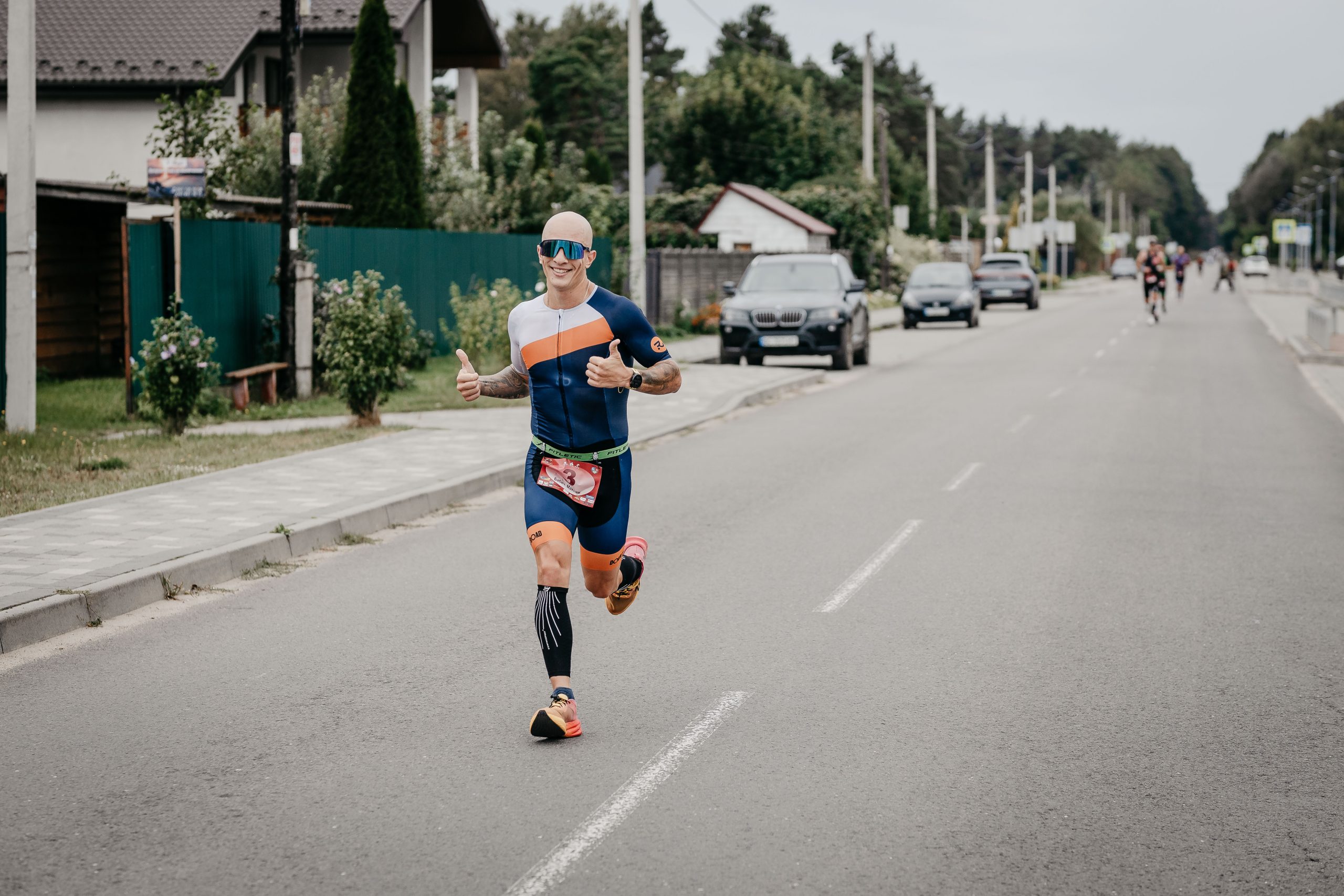Athlete motivation is the driving force of success.
This is a feeling that helps us keep going, no matter what.
But unfortunately, motivation is not constant. It goes up and down, depending on numerous factors.
One day, you feel like you can do anything, and our training session goes just perfectly.
And then the other day, you don’t feel like training at all and it is really hard to push yourself forward.
Why does it happen?
One thing is for sure: losing motivation is normal, even if you are a professional athlete.
At some point, you just lose this kick. But remember that this feeling is temporary.
To get your motivation back on track, I have looked at resources professional coaches use to motivate athletes.
In this article, we’ll explore the science behind the motivation, types of motivation, and share some of the best motivational methods available for athletes to help them reach their goals.
This information will be helpful for both amateur and professional athletes to get inspired and level up their training sessions.
Looking for the perfect gift for the triathlete in your life? Check out this selection of the best triathlete gifts for ideas and inspiration.
Understanding Athlete Motivation
Athlete motivation is a crucial factor in achieving peak performance and success in sports.
Motivation is the driving force that helps athletes focus and achieve their goals.
Simply put, athlete motivation is the inner drive that pushes someone to keep training, competing, and improving in their sport.
It can come from a desire to win, beat personal bests, or simply enjoy the activity.
Motivation helps athletes stay focused, especially when training gets tough or they face setbacks.
A motivated athlete will push through challenges because they have a strong reason to succeed.
Without motivation, it’s easy to lose interest or give up when progress slows down.
That is why athletes should understand the science behind athlete’s motivation. Specifically, intrinsic and extrinsic motivation.
Let’s dive deeper into this subject.
The Science of Motivation: Self-Determination Theory
People have been studying the science of motivation for years.
We desperately want to know how to master this art of pushing ourselves no matter what.
One of the main theories behind the motivation is Self-Determination Theory (SDT).
According to this theory, athletes are most motivated when they feel in control of their own progress, believe they’re getting better at what they do, and have a sense of connection with their coaches and teammates.
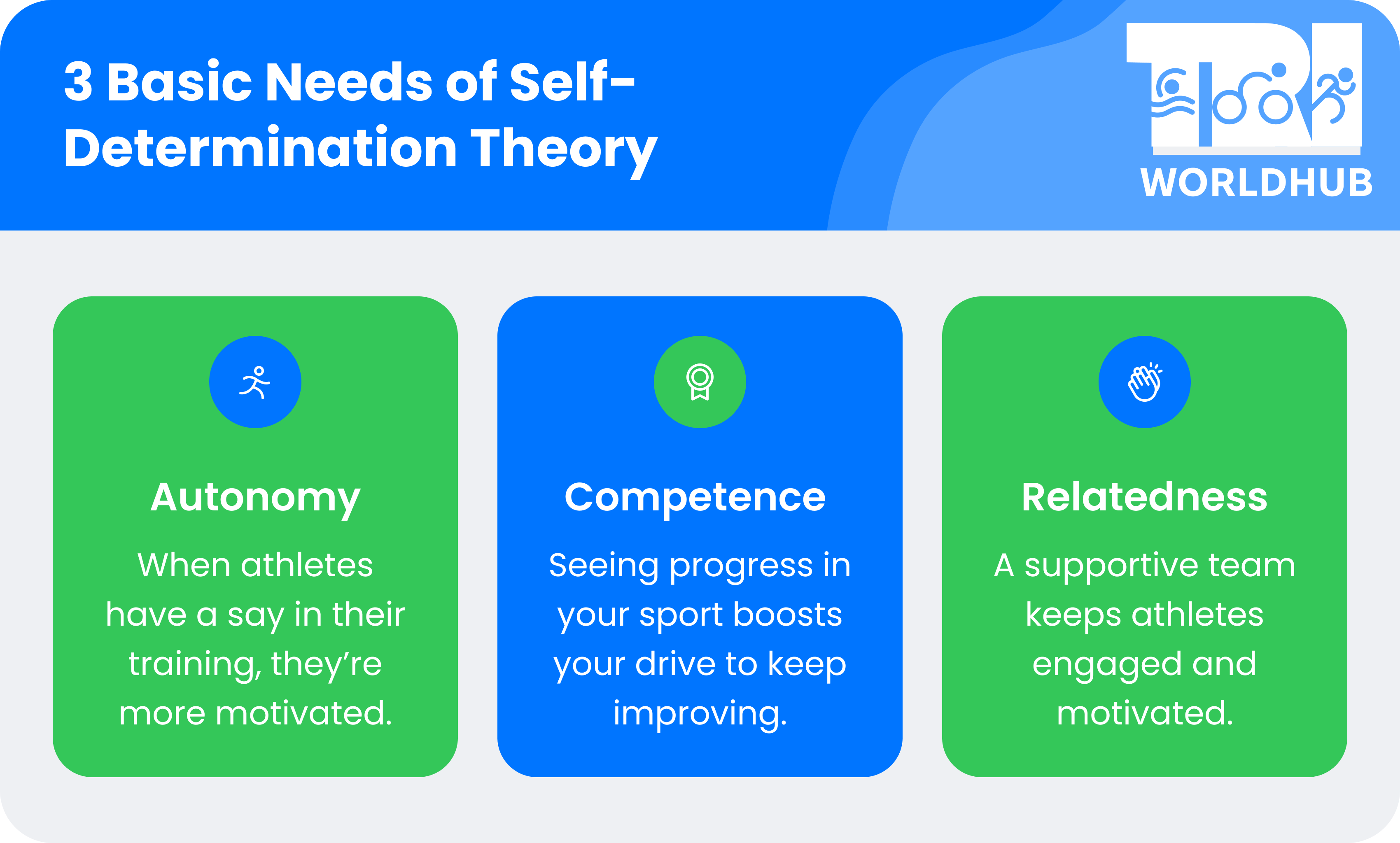
Studies from exercise psychology show that those athletes who are motivated from within (because they love the sport or want to grow) tend to stick with training longer and perform better.
On the other side, extrinsically motivated athletes tend to lose their motivation much faster.
This research on Exercise, physical activity, and self-determination theory confirms this thought.
It highlights that while rewards can encourage athletes and boost short-term performance, those who find personal meaning in their sport are more likely to stay motivated longer.
Coaches also play a huge role when it comes to motivation.
With professional coaching by their side, athletes feel more supported and encouraged. This is an additional boost of motivation that many athletes desperately need, especially on those bad days.
Now, that we have discovered that there are internal and external motivation, let’s dive deeper into each type.
I will also share some useful tips on how athletes can level up their motivation in a positive manner.
Characteristics of Intrinsically Motivated Athletes
Are you an intrinsically motivated athlete?
Let’s see.
Intrinsically motivated athletes are those who participate in sports because they enjoy the process.
If you love what you do, how you do that, and why you do that, the chances are that you are an internally motivated person.
Intrinsically motivated athletes participate because they really enjoy playing, improving their skills, and exploring their potential.
As an intrinsically motivated athlete, you are more likely to experience flow. This is an almost magical state when you are completely immersed in an activity.
Have you ever experienced that state of flow? I bet you have.
After all, intrinsically motivated athletes love their sport.
They aren’t in it for the trophies, praise, or recognition.
They enjoy the process – whether it’s learning a new skill, feeling the rush of pushing themselves, or just enjoying the activity.
These athletes stick with their training because it aligns with what they value, and they will keep going even when it gets tough.
Additionally, studies show that those intrinsically motivated athletes often stay committed for the long term.
They are more resilient in the face of setbacks and see challenges as an opportunity to improve.
Since these people do not rely on external rewards, they are often more consistent in their training and, therefore, become better over time.
In short, if you are intrinsically motivated, your passion is the main driving force that fuels your hard work and dedication.
That is something many successful athletes have in common.
Strategies to Boost Your Intrinsic Motivation
So, how do you boost your athlete’s behavior to be more motivated and self-determined?
Coaches highlight that often, leveling up motivation comes down to helping athletes rediscover the joy and personal satisfaction that comes from their sport.
One of the best ways to do this is to give them more control over their training.
When you feel like you actually have a say in your own goals or how you practice, you are more likely to stay motivated.
This is about owning the process of your own progress.
Let’s say, you are getting ready for your first Ironman race.
You don’t just blindly do everything your coach tells you. Instead, you take an active role in developing your Ironman training plan.
For example, you can tell your coach that you want to focus more on improving your cycling skills because that’s where you struggle.
The coach then will accomodate the plan according to your feedback and add more cycling workouts, like hill training, to improve your bike leg performance.
Another big factor is to focus on personal growth rather than on outcomes or winning.
Here is what I mean by that.
When you see how your skills are improving or how you get better at certain aspects of your sport, it fuels your internal drive.
Instead of fixating solely on the finish line or your place in the standings, you start paying attention to the small improvements you’re making.
Maybe you notice that your swim strokes are smoother or that you can tackle a hill on your bike without feeling as fatigued.
These moments of progress can be incredibly motivating.
It’s also important to create a supportive, team-oriented environment where you feel like you belong.
This is all about knowing that your coaches and teammates have your back, no matter what.
When you hear positive feedback from your coach or other athletes, it helps you stay engaged and committed.
And, let’s not neglect the fun part!
Regularly remind yourself why you have started the sport in the first place.
Celebrate the effort and the hard work you put in.
This will help you reinforce that sense of accomplishment that keeps you coming back for more.
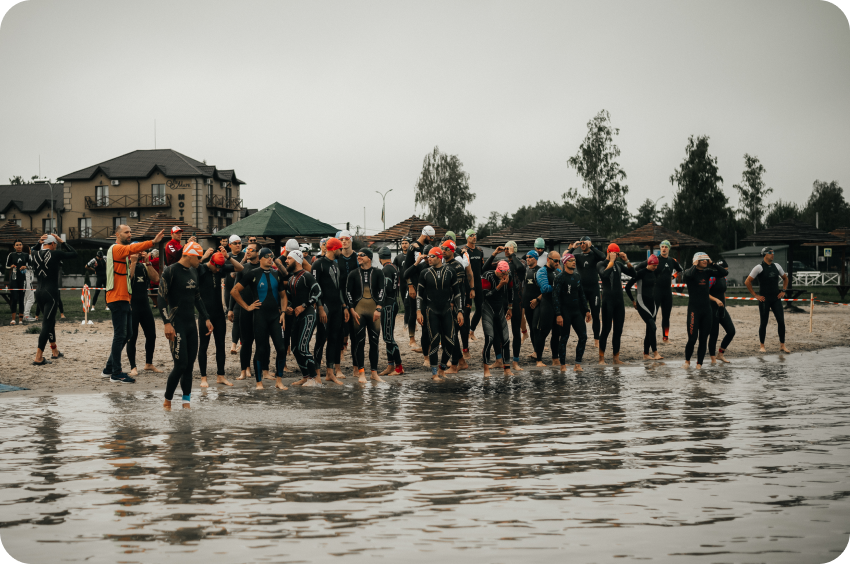
The Role of Extrinsic Motivation in Sports Psychology
Extrinsic motivation is another driving force for an athlete’s success.
This type of motivation plays an interesting role in sports psychology. Especially when it comes to helping athletes push themselves toward specific goals.
As the name implies, extrinsic motivation comes from external factors. These include rewards, recognition, and even social expectations.
Extrinsic motivation can have a big impact on how you perform.
For instance, extrinsically motivated athletes participate for medals, sponsorships, or even a place on a national team.
The desire to achieve those rewards is a strong motivator that helps you focus and stay disciplined.
And external motivation is not bad at all.
However, the key is balance.
When you only rely on extrinsic rewards, you may find yourself feeling burned out over time.
Constantly chasing something outside rather than simply enjoying the process is exhausting.
Research shows that extrinsic motivators can drive short-term results. But you need to combine these efforts with intrinsic motivation to keep the passion alive long term.
For example, professional athlete Michael Phelps shared that while winning medals was a motivator, it was his personal love for swimming that kept him going through the toughest training days.
Summing up, extrinsic motivation can definitely give athletes that extra push, especially in competitive sports.
However, to avoid burnout, you should focus on finding joy in their progress, effort, and love for the sport itself.
After all, those moments of passion and personal growth are often what keeps athletes coming back, season after season!
Check out this continuum of intrinsic and extrinsic motivation:
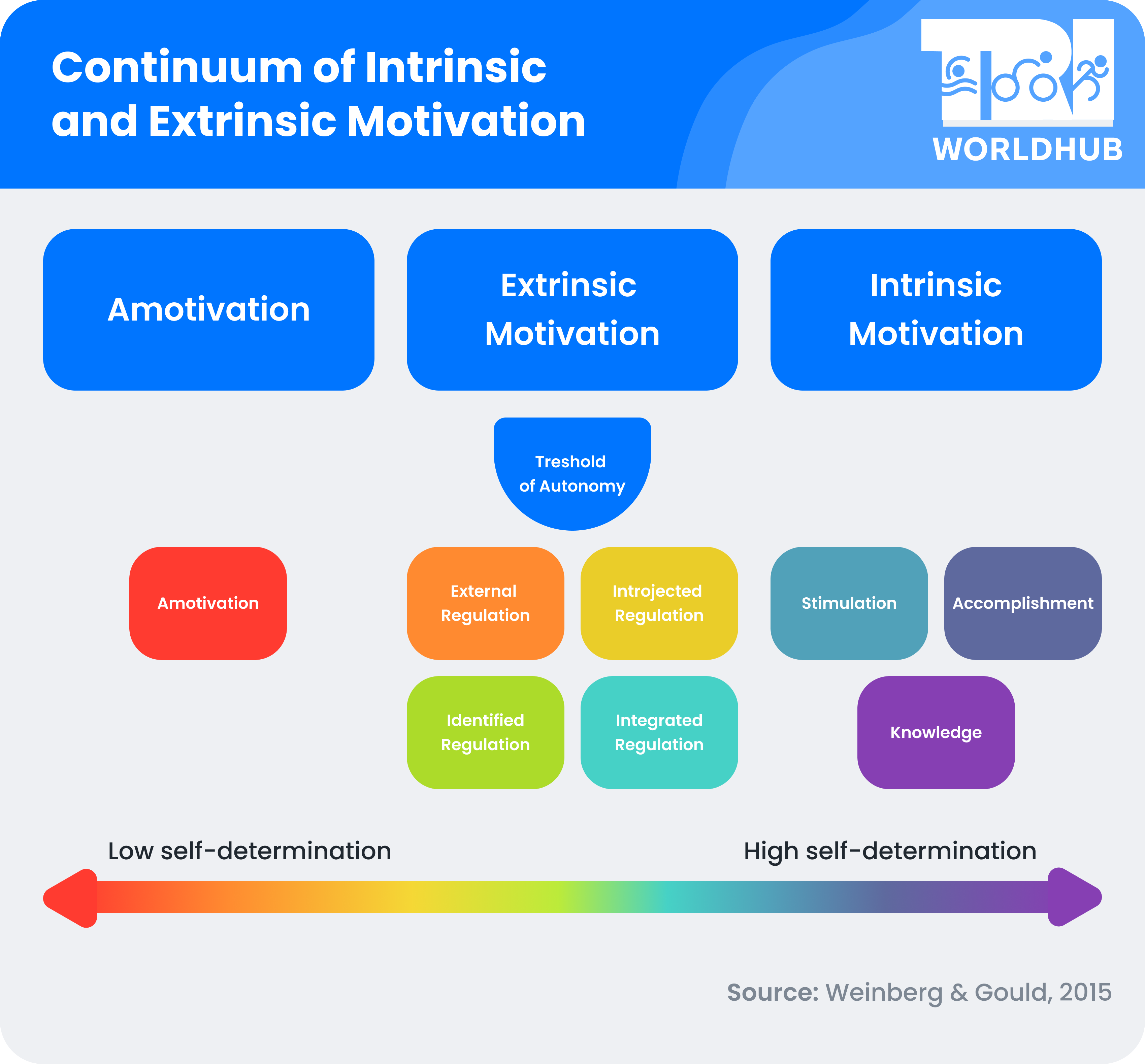
As you can see, amotivation (or non-motivation) is the lowest form of motivation. It leads to pervasive feelings of incompetence and lack of control.
Knowledge and high self-determination, on the other hand, represent the highest form of motivation.
Which is Better for Athletes: Intrinsic or Extrinsic Motivation
We have discussed that intrinsic and extrinsic motivation are important for athletes, but each plays a different role.
Intrinsic motivation, which is driven by a love for the sport or personal growth, is often more sustainable for long-term success.
Athletes who are intrinsically motivated tend to enjoy their training more, persist through challenges, and are less likely to burn out because they find personal satisfaction in their efforts.
On the other hand, extrinsic motivation can provide a powerful boost, especially in competitive environments.
Athletes may feel a strong drive to achieve when there are external rewards on the line, pushing them to perform at their highest level.
However, relying too much on extrinsic motivation can lead to pressure, stress, and even burnout, especially if athletes lose sight of the passion that brought them into the sport in the first place.
Finding the Balance Between Intrinsic or Extrinsic Motivation
The answer is to find a balance.
External rewards can motivate short term goals but the deep long term drive comes from an internal love of the sport and a desire to get better.
Another important aspect of athlete motivation is goal setting and its impact on performance.
Research shows that setting specific, measurable, achievable, relevant and time bound (SMART) goals can boost motivation and performance in athletes.
For example, a study by Locke and Latham showed that people who set specific goals perform better than those who set general goals.
Also, the feedback loop is key to motivation.
Regular feedback from coaches, peers or personal self assessment helps athletes to know their progress and adjust their training accordingly.
Positive reinforcement and constructive feedback can create a growth mindset where athletes see challenges as opportunities not threats which in turn boosts intrinsic motivation.
And finally, looking at social support can give us some clues into motivation.
Research has shown that athletes who feel they have a strong support system from coaches, family and peers are more motivated and perform better.
This sense of belonging can be a big motivator, especially in a tough sport like triathlon.
How to Overcome Motivation Challenges?
Motivation comes and goes. It is hard to keep it for a long time. But, with the right strategies, you can make it last longer.
Here are some tips that keep me motivated:
Reconnect with Your Why
Sometimes, when my motivation is low, it helps to remember why I started in the first place.
I love seeing the transformation in my body. I strive to be strong, resilient, and I love the feeling of pushing my limits.
Feel free to learn more about my triathlon journey.
Set Small, Achievable Goals
Starting small is crucial. You can’t just change yourself in one day.
I always set small daily goals, like improving my swim technique or focusing on my nutrition strategy, to stay motivated.
Achieving these “micro-goals” releases dopamine. This is a brain chemical that helps sustain motivation over time.
Switch Things Up
Doing the same thing over and over again for years can sound like a nightmare for many.
I feel you.
But your triathlon training shouldn’t be like that.
Try to change your training routines to keep things fresh.
For instance, you can mix interval cycling training with mountain biking or try new swim workouts.
This variety in training helps prevent burnout and keeps you mentally engaged.
Lean on Your Support System
The sense of achievement is much better when you have someone to share it with.
That is why having a supportive coach and teammates is one of the best things that can happen to an athlete.
With the right people by your side, you can push yourself through tough times.
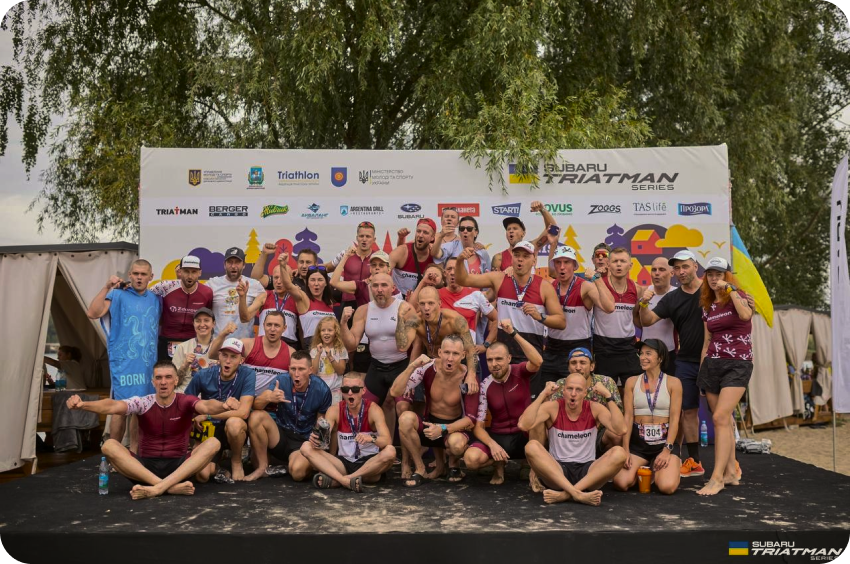
Focus on Effort, Not Results
Focusing solely on winning can be overwhelming.
This can totally neglect the effort you put into the process.
I always try to emphasize effort over outcomes, especially in hard training blocks.
When you focus on the process and effort, it helps you stay committed even when results take time.
Visualize Succes
That may sound controversial for some athletes. But visualization can really help to boost your motivation and confidence.
Many elite athletes use visualization techniques. They picture themselves nailing each part of the race or training.
For example, the winner of the 2024 Bank of America Chicago Marathon and the holder of an unnoficial world record (her marathon time is 2 hours, 9 minutes and 56 seconds), Ruth Chepngetich, says, “This is my dream that has come true. I fight a lot thinking about world record and I have fulfilled it and I’m much grateful.”
Be Kind to Yourself
This is something that is not talked enough about among professional atheltes.
Motivation comes in waves, and experienced athletes should talk openly about the importance of self-compassion during challenging periods.
In fact, being kind to yourself when motivation dips helps you recover faster and avoid burnout
Even the most dedicated athletes hit rough patches.
Try to accept that, but still be focused on what you love about the sport, set achievable goals, and surround yourself with support.
This will help you find your way back to motivation.
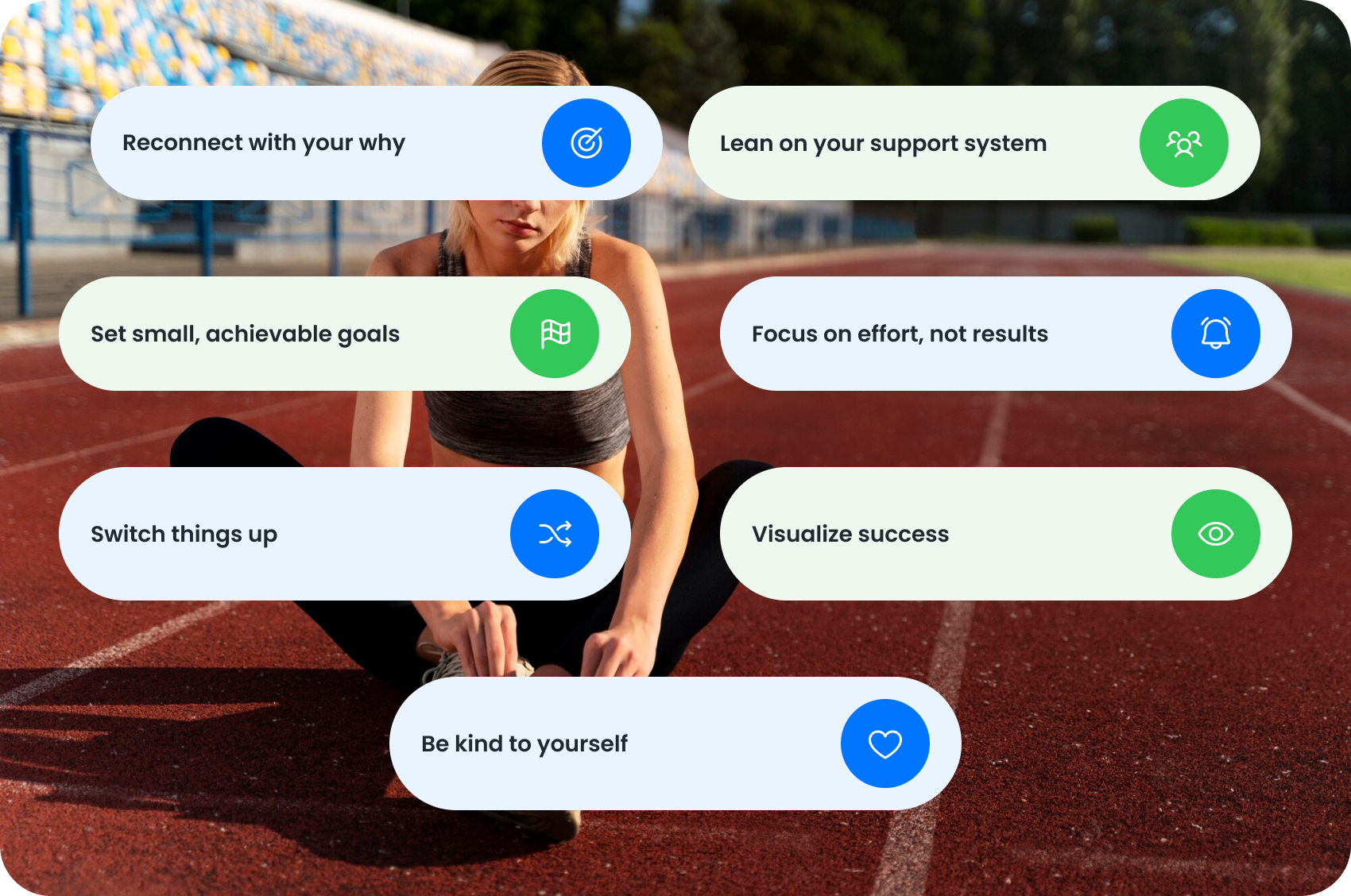
Final Thoughts on Motivation
Motivation is what drives athletes forward.
You want to boost your motivation to achieve your peak performance and success in sports.
Self-determination theory divides motivation into intrinsic and extrinsic.
Intrinsic motivation comes from your internal love for sport and desire to get better because you enjoy what you do.
Extrinsic motivation is often fuelled by external rewards and recognition.
Both internal pressure and external regulation are crucial for athlete’s success.
The key is to find a balance between your inner desire to get better and a need for external rewards and positive feedback.
I also shared some strategies that are based on self-determination theory and can help athletes boost their motivation.
These include having control over the training process, a deep focus on personal growth, and a supportive environment.
Besides these crucial factors, I highlighted some tips that help me boost my motivation.
When I struggle to find motivation, I remind myself why I started triathlon in the first place. Then a set small and achievable goals and switch trainings to fuel myself a little bit more.
Of course, my coach and teammates motivate me a lot, as well as focus on the process rather than on an end goal.
On those hard moments, I also try to visialuze success and just be kind to myself, because there will be good and, and will be bad days, but being able to do what I like is the only thing that matters.
Choosing fast food wisely can help boost your recovery — get tips and suggestions in our article on fast food after a workout.




